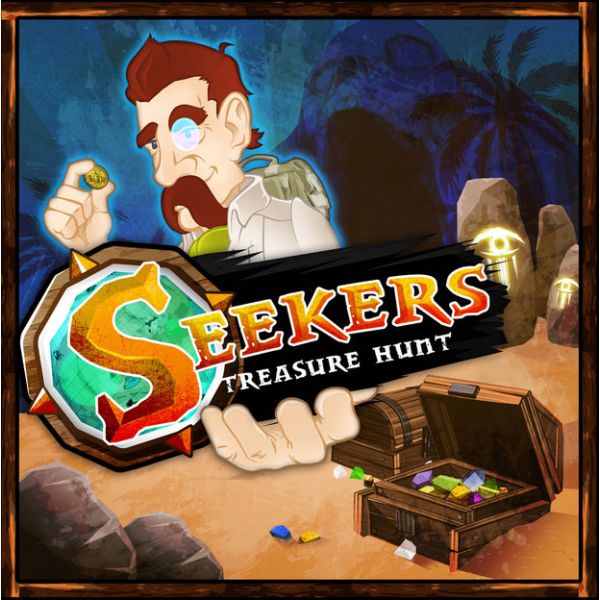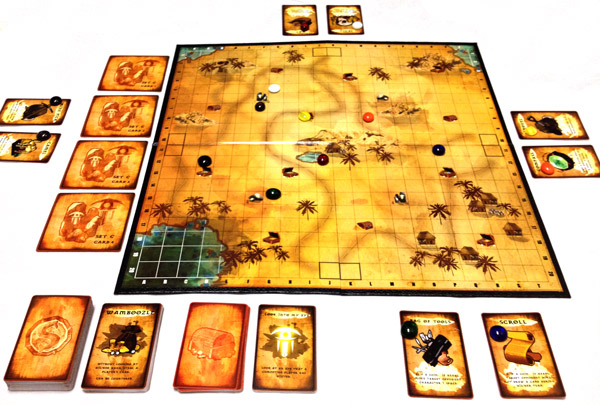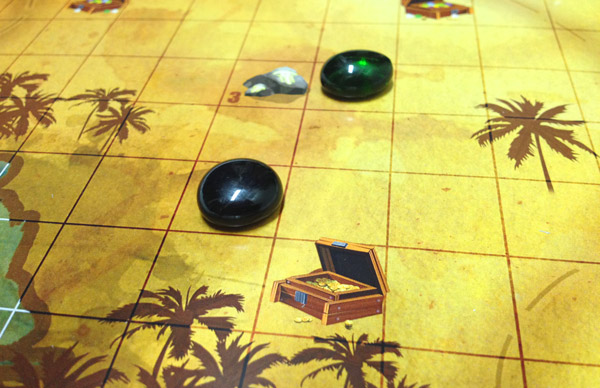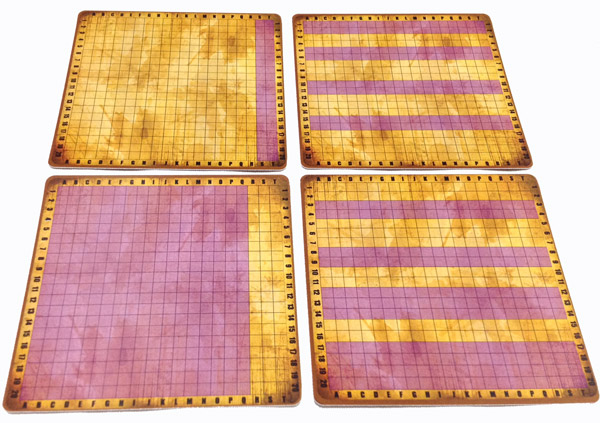Seekers: Treasure Hunt - A Kickstarter Preview

There is a huge treasure buried somewhere in the desert sand and you are an archeologist trying to hone in on its exact location. You'll find smaller treasures along the way that will aid you in your journey, and magical eye stones will give you a glimpse into the hidden treasure's location. The combined vision of all 4 eye stones will tell you exactly where it is—then you'll have to race to dig up the treasure before the other archeologists to claim it as your own!
Seekers: Treasure Hunt is a new game by Jeffrey Hsu that is now seeking your support on Kickstarter. We were recently given the opportunity to evaluate a prototype of the game and really enjoyed it. To give you an idea of whether or not it's for you, we'll first dive into the game itself and then share some of our impressions about the game.

Gameplay
The object of the game is to view all 4 eye stones to determine the exact location of the buried treasure, then be the first to dig up the treasure at that location. The board consists of a 20x20 grid, with 4 numbered eye stone spaces and several treasure chest symbols distributed around the board. There are 2 decks of cards: a player deck and a treasure chest deck. 3 cards from the player deck are dealt to each player initially. A set of 4 eye stone cards are also selected at the beginning of the game and placed next to the board (there are 8 sets total).
Each player controls two archeologists who both move around the board searching for treasure and finding clues. Each one has a special ability to aid with movement, to provide additional cards, or hinder other players. Many of these abilities are activated with the flip of a coin. At the beginning of the game, each player places his 2 archeologist tokens on the side of the board nearest himself.
On a turn, the current player draws a card from the player deck, moves both of his tokens, plays as many cards from his hand as desired, then discards down to the hand limit (3 player cards and 2 treasure chest cards). Each token can be moved one space left, right, up, or down on the board. If a token lands on a treasure chest symbol, the player draws a treasure chest card to add to his hand. This only happens once per treasure chest symbol, per player.

Player cards and treasure chest cards both offer different actions to benefit the player, although the treasure chest cards are much more powerful. For instance, a player card might allow a player to make additional movements, draw extra cards, view or steal other players' cards, or skip another player's turn. A treasure chest card, on the other hand, might allow a player to swap token locations with another player, teleport directly to an eye stone, force all other players to discard their hand, and so forth.
If a token lands on an eye stone space, the player may look at the corresponding eye stone card (and refer to it again at any time). Each card shows several rows or columns of the board that are shaded, meaning the buried treasure is not in those rows or columns. Each additional card provides more information about the location, and with all 4 cards combined, the exact location can be easily deciphered. Once a player has viewed all 4 eye cards, he must move his token to that location and then, on his next turn, dig up the treasure and win the game.

Review
Seekers: Treasure Hunt is a very enjoyable casual game that was well-received by our evaluators. The idea of combining multiple eye stone cards together to find the treasure, each of which is insufficient on its own, is a great concept that really adds to the theme and overall feel of the game. Learning a little bit of information with each eye stone also helps direct the player's strategic decisions.
At first, it seemed strange that each player controls two archeologist tokens, but we quickly realized that we wouldn't have it any other way. This mechanic allows players to strategize each token's movement in different ways. For instance, once it is discovered that one token is nearer to the buried treasure, that token can begin moving to that spot, while the other one can continue to reach new treasure chest locations and eye stones.
The ability to get treasure chest cards, which are more powerful than the standard player cards, is a nice addition. Doing so often requires going a bit out of the way, but it is usually worth it. The board is quite big in terms of the grid size (and could even benefit from being reduced a bit), making it a long journey from one side of the board to another. Fortunately, treasure chest cards can really benefit a player by teleporting or eliminating the need to travel to an eye stone. Many of the cards from both decks require the player to specifically target another player, which gives the game a strong "take that" element—an aspect we enjoyed, but which may not be ideal for Eurogame purists.
While the prototype we evaluated is very good, we found a few aspects of the game that could be improved upon. Fortunately, the publisher will be making several great changes to the final version that we couldn't be happier about. For instance, instead of just 8 sets of eye stone cards (i.e., treasure locations), separate sets of rows and columns will be combined together to create a full 64 possible locations. There will also be various player helps and design changes to improve the gameplay experience. The publisher seems very committed to making this game the very best it can be.
Seekers: Treasure Hunt is a great game that I believe is a good choice for casual gamers. The artwork and components are quite nice, and, in fact, are some of the best we have seen in a pre-production prototype. The game feels polished and nearly complete. It is relatively quick and easy to learn, with added replay value provided by the different player abilities. Personally, I look forward to playing it again soon.
If you're interested, take a look at the Kickstarter campaign from now through January 5, 2014.
Pros: Unique treasure-finding mechanic, competitive gameplay, easy to learn, and fun
Cons: "Take that" style of gameplay may not be for everyone
Disclaimer: this preview is based on our evaluation of an unpublished prototype of the game, which is subject to change prior to publication. While a modest payment was received to expedite the review process, our thoughts and opinions expressed here are honest and accurate.





How does this game compare to Tobago, which seems to have a similar treasure-finding mechanic?
I haven't had the pleasure yet of playing Tobago, so I can't say which one is better or whether or not they are different enough to have in the same game collection. But after some research on Tobago, here are some of the differences I found between the games:
Thanks for a really substantive reply. Way more than I expected. :-)
I have Tobago on my shelf and was trying to figure out if I need two treasure-finding games. Your insight certainly helps. Thanks.
It does look great, and I like that it can be played by just two people. Thanks for highlighting this Kickstarter!